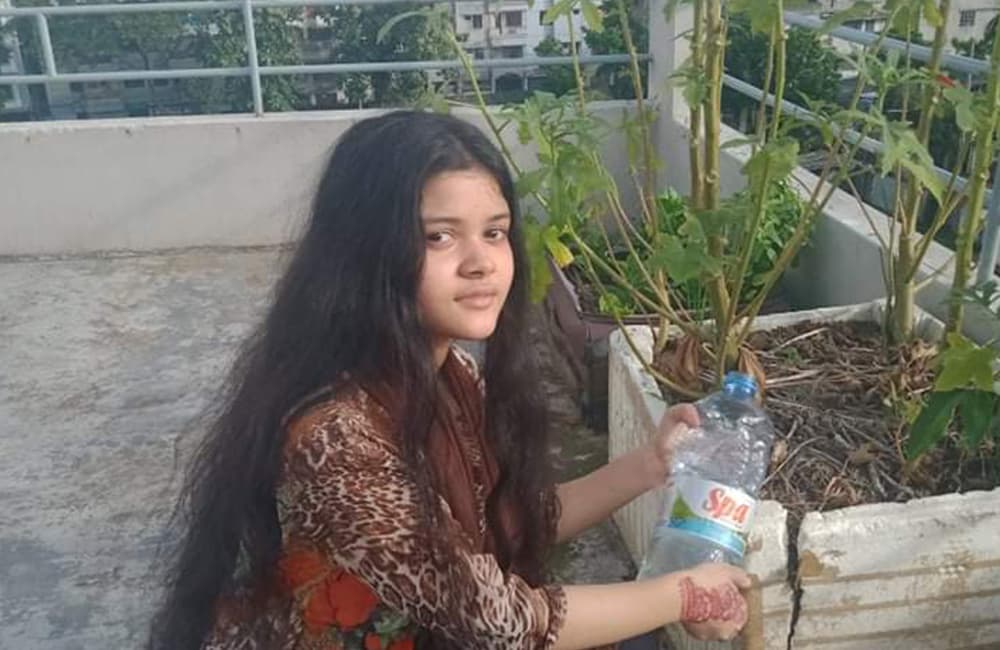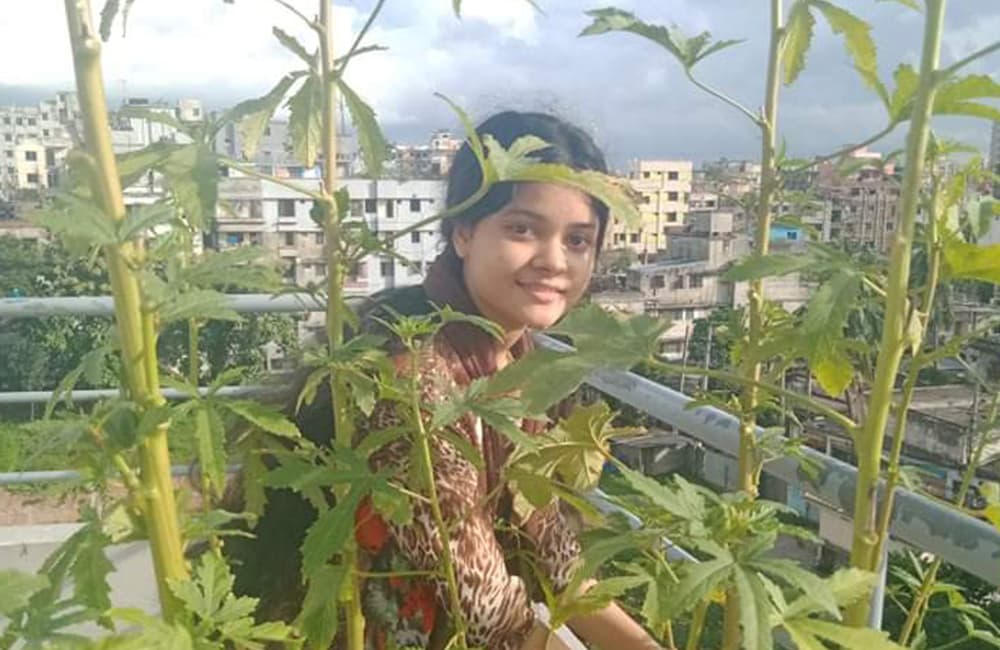One girl’s pioneering rooftop garden offsets the ‘heat island’ effect in Dhaka
High above the bustling streets of Dhaka on the flat concrete rooftop of a seven-storey building, a young girl crouches over a make-shift planter box bursting with green shoots. She pours water from an old soft drink bottle onto the seedlings, smiling as she recalls the challenges she’s overcome to be here.
This is Diya, a 15-year-old schoolgirl living in the heart of the hot, dusty and densely populated metropolis that is the capital of Bangladesh. Today, Diya is respected by her landlord and neighbours for her determination to create this oasis on their rooftop. But it wasn’t always this way.
Diya was in Year 10 at Ali Hossain Girls High School, where she was a keen member of the Green Club, part of the Child Centred Climate Change Adaptation (CCA) Project. The CCA Project is run by Save the Children thanks to the generosity of our individual supporters and funding from the Australian Government. When COVID-19 restrictions closed her school, and a national lockdown confined her to home, Diya had plenty of time to think.
Diya’s idea
As Diya explains, “It is very difficult for me to spend time studying from home throughout the day. I have learned about the impact of climate change through the Green Club meetings… I thought a lot about what to do for a safe home in a small scale. In this context, I have decided to do gardening on the rooftop of our rented house.”
After talking with her parents about the idea, Diya’s mother approached the landlord, who rejected the idea outright, thinking the roof would be damaged and mosquito borne diseases would increase. But Diya wouldn’t be deterred. A few days later she returned with her mother to explain the reasons behind her plan to the landlord.
“I just tried to (get him to) understand, Dhaka city is becoming hot island, the temperature is rising … and biodiversity is being lost …. So, we should do something about it now. When he agreed, my mother and I took the initiative to make a rooftop garden… Later on, he supports me a lot, beyond imagination” she says triumphantly.

Diya learned about the impact of climate change and the benefits rooftop gardens can provide through the
Green Club meetings run by Save the Children at her school.
Image: Saidur Rahman.
Once she had the go-ahead there was no stopping Diya
Diya explains, “My father bought the soil, organic manure and I started planting by using wastage buckets …We planted punishak, potatoes, sweet potato, coriander leaves, mint leaves and sweet pumpkin, medicine plant henna and basil.”
Diya's mother adds, “I am so proud of my daughter, that I can't do what my daughter has done. From the rooftop gardening, we are getting oxygen, as well as fresh vegetables. I also told my neighbours about the benefits of rooftop gardening. We are very happy for Diya's initiative. Thanks to Save the Children for inspiring Diya to take the initiative.”
The CCA Green Club project that runs in Diya’s school aims to increase the knowledge and skills of young people on climate change adaptation, so that they can take a leading role in managing climatic risks as ‘Future Leaders’. Thanks to the support of our individual donors and the Australian Government, the project gives children the opportunity to learn about climate change adaptation and risk reduction activities, such as Diya’s rooftop garden initiative.
Diya shares her home of Dhaka city with 22 million neighbours
Dhaka’s urban population represents a significant percentage of Bangladesh’s total population of 166 million people. Despite its already huge population, Dhaka is still growing rapidly and is quickly losing ecosystems due to urbanization.
As a country, Bangladesh is extremely vulnerable to the impacts of climate change because of its geographical location, high population density, high levels of poverty, and the reliance of many livelihoods on climate-sensitive sectors, particularly rural agriculture and fisheries. In this context, it is critical to try new, low-cost climate adaptation and mitigation measures to ensure food security and create alternative livelihoods.

“We will get the benefits from rooftop gardening by getting fresh vegetables, foods and fruits,low-cost organic products,
produce oxygen, and … we will be able to spend time happily” - Diya
Image: Saidur Rahman
A rooftop garden is suitable climate adaptation technology in an urban context like Dhaka and is a popular option when it includes organic farming. As well as providing fresh vegetables, rooftop temperature control, and recreational space, green roofs can reduce the distribution of dust in the air, which leads to decreasing greenhouse emissions in urban areas.
Some of Diya's classmates have shown their interest after her initiative was publicised on Facebook and hopefully it will spread among others. And as Diya happily adds, the landlord is now an advocate, “Now (the) homeowner is very happy and assures all kinds of cooperation to scale the roof top garden…family members are very happy to visit our rooftop garden and very often they come on.”
If scaled up, Diya’s pioneering rooftop garden could help reduce the ‘heat island’ effect in Dhaka. As they say, from little things, big things grow.
Save the Children’s Child Centred Climate Change Adaptation Project is supported by the Australian Government through the Australian NGO Cooperation Program (ANCP).
